When people Google your name or business, what shows up? That’s the heart of online reputation management, and it matters more than ever.
Maybe you’ve noticed a few bad reviews showing up in search results. Or maybe you’re just realizing how much your online presence influences trust, whether you’re closing a sale, applying for a job, or running a business.
This article breaks it all down in plain English—no fluff or jargon. You’ll learn what ORM actually involves, how it impacts your success, and most importantly, how to take action before your reputation starts working against you.
What Is Online Reputation Management?
Online Reputation Management (ORM) is the practice of shaping how people perceive you or your brand online. It’s about making sure the first thing someone sees when they Google your name or business leaves a good impression.
Put simply, ORM is how you monitor, influence, and manage your online image. In a nutshell, these are its main functions:
- Brand protection: Guarding your image from false claims, negative reviews, or reputation attacks.
- Trust building: Increasing transparency and credibility with your audience.
- Customer engagement: Responding to feedback and building relationships publicly.
What Does ORM Involve?
Online reputation management isn’t a one-time fix, it’s an ongoing process. Here are its core components:
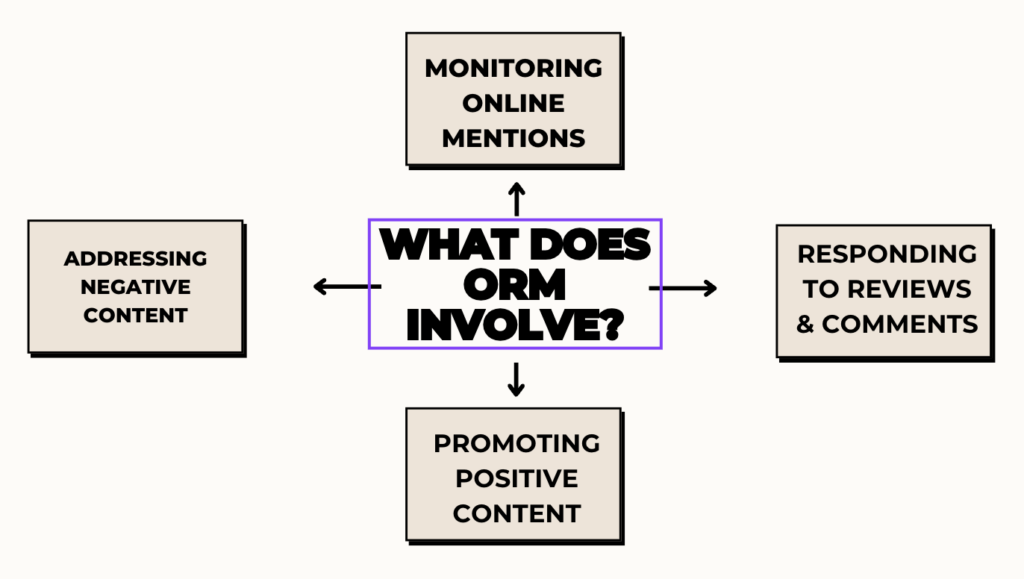
- Monitoring online mentions: This means keeping an eye on what people are saying about you on review sites, blogs, social media, forums, and even news articles.
- Responding to reviews & comments: Whether it’s a glowing five-star review or harsh criticism, how you respond matters. Timely, thoughtful replies can turn a negative into a positive and show you care about your reputation.
- Promoting positive content: This includes publishing blog posts, customer testimonials, case studies, or media coverage that highlights your strengths. The more good content out there, the more it pushes negative or irrelevant results down.
- Suppressing or addressing negative content: ORM doesn’t always mean deleting negative comments (which often isn’t possible). It’s about addressing the issue head-on, resolving complaints, and building so much positive content that the bad stuff gets buried or recontextualized.
6 Key Platforms That Influence Your Online Reputation
Your online reputation is shaped by more than just your website. It also includes:
- Google search results
- Review sites like Yelp, Trustpilot, and G2
- Social media platforms like Facebook, Twitter (X), LinkedIn, Instagram
- Online forums like Reddit and Quora
- Blog posts (yours or others’)
- News sites and press releases
Proactive vs Reactive ORM
There are 2 ways to approach ORM: proactive and reactive.
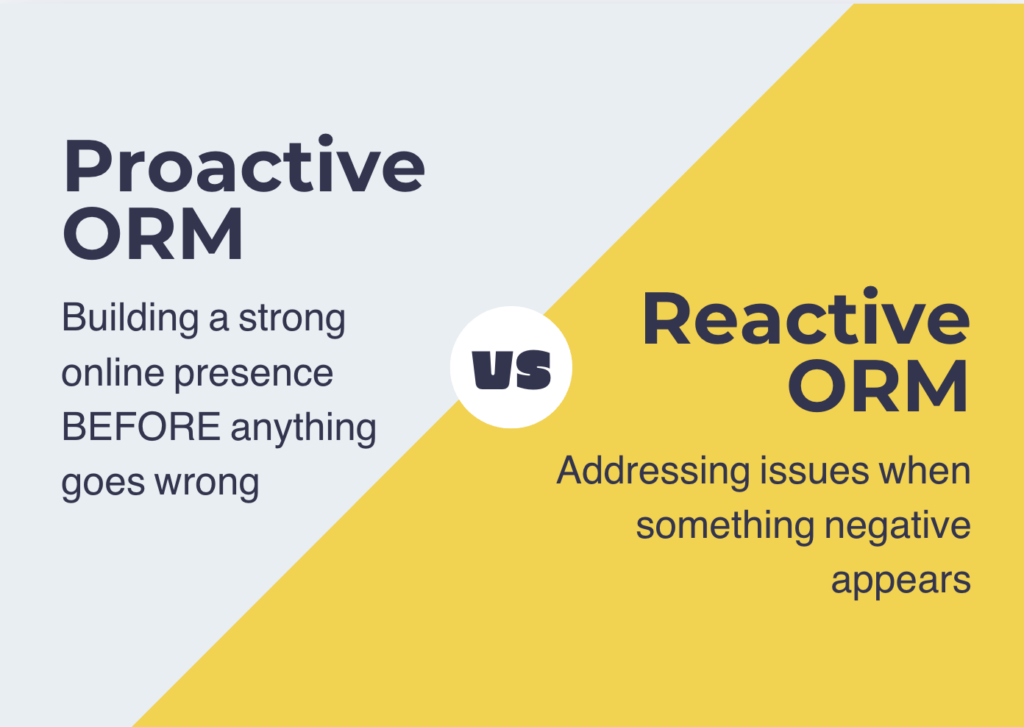
Proactive ORM is all about building a strong online presence before anything goes wrong. You create valuable content, encourage happy customers to leave reviews, and stay active online so you stay in control of the narrative.
Reactive ORM kicks in when something negative appears. A bad review, a misleading article, or a social media backlash. It focuses on damage control and reputation repair.
Ideally, you want to do both. Think of proactive ORM as wearing sunscreen, and reactive ORM as treating a sunburn. One protects your reputation in the long run, while the other helps when trouble shows up.
Why Is Online Reputation Management Important?
Online reputation management isn’t just about looking good online. It affects whether people trust you, buy from you, or even find you on Google. These days, one review or comment can spread fast and change how people see you, even if you’re not part of the conversation.
Here’s why it really matters:
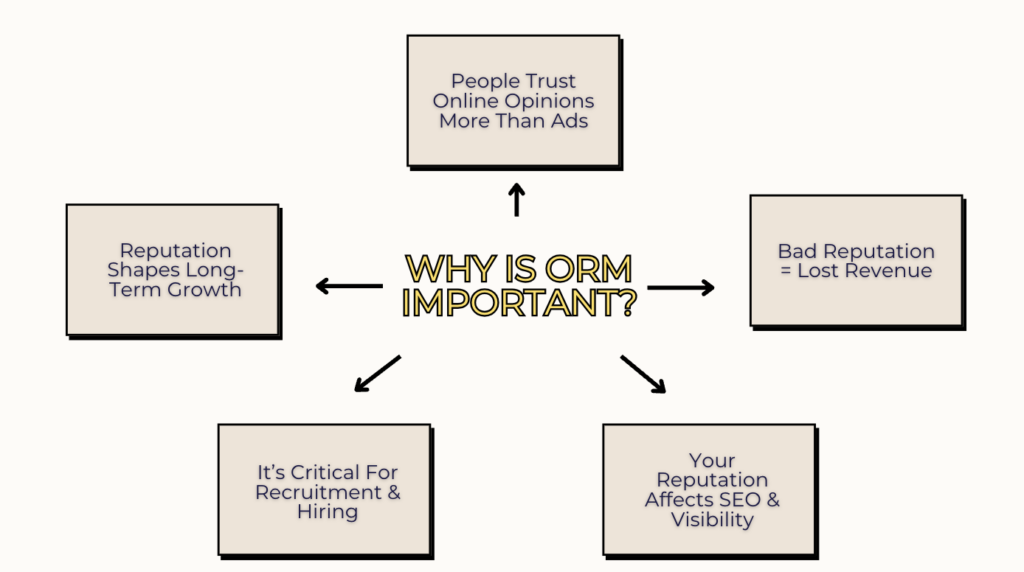
1. People Trust Online Opinions More Than Ads
Before making decisions, people look you up. In fact, 93% of consumers read online reviews before buying a product. Reviews are today’s word-of-mouth, only they’re permanent and public.
What’s more, 84% of people trust online reviews as much as a personal recommendation when they’re recent and relevant. That means your reputation online is your first impression whether it’s your Google Business profile, Yelp page, or LinkedIn search result.
2. Bad Reputation = Lost Revenue
A few negative reviews or an unanswered complaint can cost you business. Harvard Business School found that a one-star increase in a Yelp rating can generate a 5–9% increase in revenue. Flip that around, and a one-star drop can hurt your bottom line.
And it’s not just about reviews. A poor or outdated online presence can cause potential clients or employers to go with a competitor even if your service is better. People assume your online image reflects your real-world professionalism.
3. Your Reputation Affects SEO & Visibility
Google wants to show users the most relevant and trustworthy content. That includes user reviews, star ratings, mentions in the press, and high-quality backlinks. If your brand is associated with trust and positive engagement, Google is more likely to feature your content prominently.
Also, tools like Google’s E-E-A-T guidelines (Experience, Expertise, Authoritativeness, Trustworthiness) mean your reputation can now influence your search rankings. If people question your credibility, so might the algorithm.
4. It’s Critical For Recruitment & Hiring
Your online reputation doesn’t just affect customers, it influences potential hires. 86% of job seekers check out employer reviews and ratings before applying for a job. A negative employer brand can not only drive away top talent but cost you more to attract them.
Companies with strong reputations see a 28% reduction in turnover and spend 50% less per hire. That’s how closely your public image is tied to internal success.
5. Reputation Shapes Long-Term Growth
Whether you’re building a business or a personal brand, your reputation compounds. A consistent, positive online presence builds trust over time, bringing in:
- More referrals
- Better customer retention
- Increased brand authority
- Greater resilience during crises
On the flip side, reputation damage, especially if unmanaged, can take years to recover from. You can’t control everything people say about you, but you can control how you respond and what you amplify. Let’s dive deeper into that a bit.
What Happens If You Ignore Your Online Reputation?
Ignoring your online reputation doesn’t make problems go away, it just lets them shape how others see you without your input.
What Can Go Wrong?
Negative Reviews Gain Traction
A single bad review isn’t a dealbreaker, but when it goes unanswered, it can become the dominant voice. 94% of consumers say a bad review has convinced them to avoid a business. No response often reads as “we don’t care.”
Customer Complaints Can Go Viral
Social media gives frustrated customers a megaphone and they use it especially when they feel ignored. One unresolved tweet or TikTok video can quickly spiral into a public relations headache.
Rumors And Misinformation Spread
If you’re not actively monitoring your brand, false information on blogs, forums, or review sites can spread. Once Google indexes it, it can live at the top of your search results for months or even years.
What Are The Consequences?
Lost Sales And Leads
89% of consumers check online reviews before making a purchase. If what they find is negative or worse, unaddressed, they’ll go with a competitor who looks more trustworthy.
Lower Search Visibility
Google factors in review quantity, recency, and quality when ranking local results. Poor engagement or consistent negativity can lead to declines in local SEO rankings, making you harder to find.
Higher Costs To Recover
Once your reputation takes a hit, cleaning it up isn’t easy or cheap. Crisis PR campaigns, paid reputation repair, or legal consultations can cost thousands and take months to show results.
Bottom line? Not managing your online reputation means you’re handing the mic to everyone else. If the loudest voices are unhappy ones, it’s your brand and your business that pays the price.
How Online Reputation Management Works + Examples
Online reputation management isn’t a one-time fix, it’s a continuous process. Whether you’re a business owner or building a personal brand, managing your reputation means staying active, aware, and authentic across every online channel.
Here’s how it works, step by step:
Step 1: Audit Your Online Presence
Start by searching your name or business on Google. What shows up on page one? Check your social media profiles, review sites (like Yelp, Trustpilot, Google Business), blog mentions, and forums.
You are looking to answer:
- What are people saying?
- Are there negative reviews or outdated information?
- Does your brand reflect your values?
Example:
After a quick search, you notice most people are landing on an outdated product page that doesn’t reflect your current inventory. Your Google listing is missing new product categories, and one review mentions confusion about whether you carry certain accessories.
You update your listings, refresh your homepage content, and make sure popular sections like this golf cart accessories page are easy to find and clearly linked from your social profiles. With those updates in place, search results start highlighting more accurate, helpful content, and customer questions drop noticeably.
Step 2: Set Up Monitoring Tools
You can’t respond to what you don’t see. Use free tools like Google Alerts or paid ones like Mention, Brand24, or Reputology to get notified when someone talks about your brand.
These tools track:
- Mentions across the web and social media
- Keyword alerts tied to your name or business
- Sentiment trends (positive, negative, neutral)
Example:
After setting up alerts, you get notified about a blog post reviewing your service, something you would’ve missed otherwise. It’s positive, so you leave a quick thank-you comment and share it on social media.
Or negative comments are piling up on Facebook and Twitter, and people are frustrated that no one received a heads-up. You quickly join the conversation to acknowledge the issue and explain the steps you’re taking.
To avoid this in the future, you set up a real-time emergency notification system so you can send instant updates to customers by voice or SMS whenever there’s an urgent change or outage.
Step 3: Respond to Reviews & Comments
A review, positive or negative, is a chance to build trust. Thank people who leave great feedback. When facing criticism, stay calm, professional, and solution-focused.
Tips:
- Use templates to streamline responses (but personalize them)
- Respond within 24–48 hours when possible
- Take sensitive conversations offline if needed
Example:
For businesses in the outdoor living space or home improvement, reviews often mention product durability. One customer leaves a 2-star review saying products like these outdoor cabinets didn’t hold up in coastal weather (which is ironic because it should be built for this kind of weather).
The company responds promptly, apologizing, offering a replacement, and linking to their updated line of weather-resistant outdoor kitchen cabinets designed for tougher climates. The reviewer updates their rating, and new shoppers see the brand’s accountability in action.
Step 4: Create Positive Content
Don’t just react, create. Publish blog posts, high-quality images, case studies, customer success stories, or press releases that show your values, expertise, and results. Hire an expert to create content that can push negative or irrelevant results lower in search rankings.
Ideas to create:
- Blog articles with industry tips
- Video testimonials from happy clients
- Behind-the-scenes content or employee stories
- Press coverage or award announcements
Example:
After noticing that older, mixed reviews were showing up high on Google, you publish a blog post answering common customer questions and add fresh testimonials to your homepage. Over the next few weeks, that content starts ranking higher and gives people something better to click and trust.
Step 5: Engage On Social Media
People expect you to be present and responsive. Comment back, reshare customer stories, and join conversations that matter to your audience. Engage on your social channels, automate when needed, to help build authority and humanize your brand.
Example:
You notice someone tagging your product in a story with great feedback. Instead of just liking it, you reshare it, add a thank-you message, and respond with a short tip to help them get even more out of the product. Not only do they become repeat customers, but they tell others and now you’ve got free word-of-mouth working for you.
Step 6: Work With Experts When Needed
If you’re overwhelmed or facing a serious issue like negative press or a fake review attack, it’s worth getting professional help. ORM agencies and tools can guide strategy, offer cleanup services, and protect your brand at scale.
Example:
After a string of fake one-star reviews hits your Google profile, you reach out to a reputation management agency. They help you flag and remove fake reviews, launch a content campaign to highlight real customer stories, and improve your search results over the next few months. Without help, it would’ve taken much longer to bounce back.
Reputation management isn’t about faking perfection. It’s about showing up consistently and being honest. Respond thoughtfully, post regularly, and lead with integrity. Over time, people trust not just what you sell, but how you show up online.
Who Needs Online Reputation Management?
See if your brand fits into one of these categories.
Small Businesses
Local service providers, restaurants, salons, and clinics live and die by word of mouth and today, that means reviews. A few bad ratings on Google or Yelp can scare off new customers. Managing your reputation helps you show off great service, respond to feedback, and build trust in your community.
E-Commerce Brands
When your entire business runs online, your reputation is your storefront. Product reviews, influencer mentions, social media comments all of it shapes buyer decisions. A strong ORM strategy helps you stay ahead of negative feedback and highlight your best customer experiences.
Solopreneurs & Freelancers
If your name is your brand, what people find when they Google you matters. Whether you’re a coach, consultant, designer, or writer, your reputation affects referrals, pricing power, and client trust. Managing it means making sure your best work and feedback are easy to find.
Corporations
Bigger companies face bigger risks. One employee tweet, viral video, or unhappy customer post can turn into a crisis overnight. That’s why brands invest in ongoing monitoring, crisis response strategies, and reputation repair to catch issues early and protect long-term trust.
Job Seekers & Professionals
Recruiters and hiring managers Google applicants every time. If your LinkedIn is outdated, or if a random comment from years ago shows up in search results, it can affect opportunities. Managing your digital presence helps you look polished, reliable, and ready.
How To Manage Your Online Reputation
Managing your online reputation doesn’t have to be overwhelming. It’s about building habits that keep you visible, trustworthy, and in control of your story. Here’s how you can do it consistently:
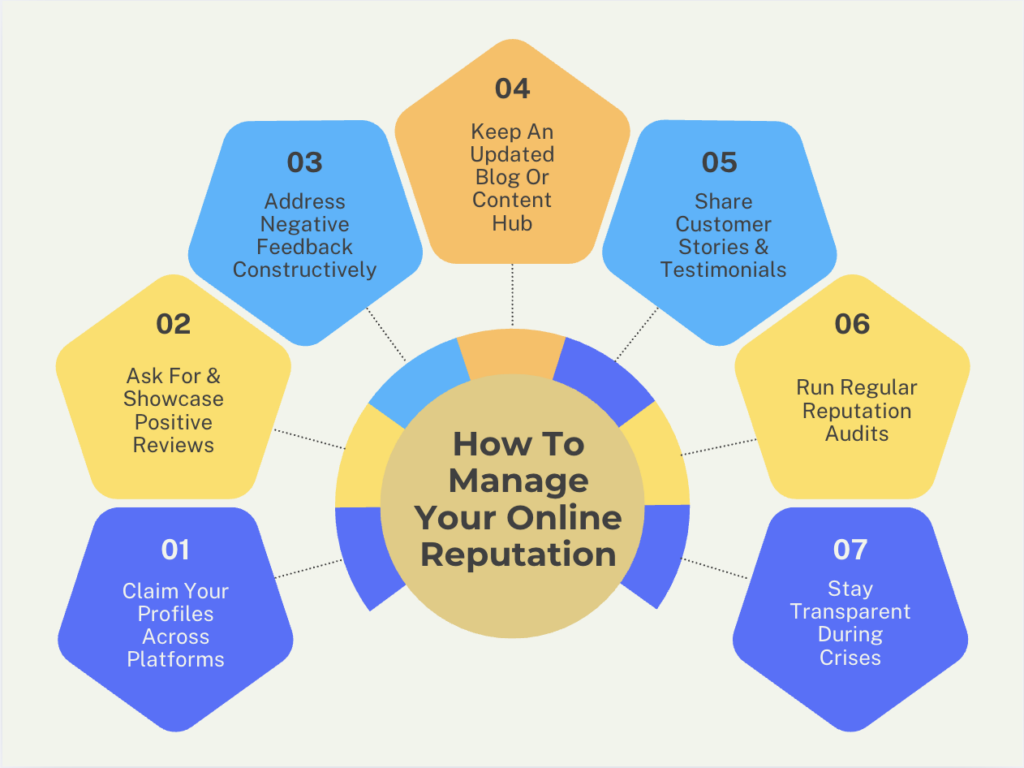
I. Claim Your Profiles Across Platforms
Secure your business name (or personal name) on platforms like Google Business, Yelp, Facebook, Instagram, LinkedIn, and industry-specific directories. Even if you’re not active on all of them, claiming your profiles prevents confusion and keeps someone else from pretending to be you.
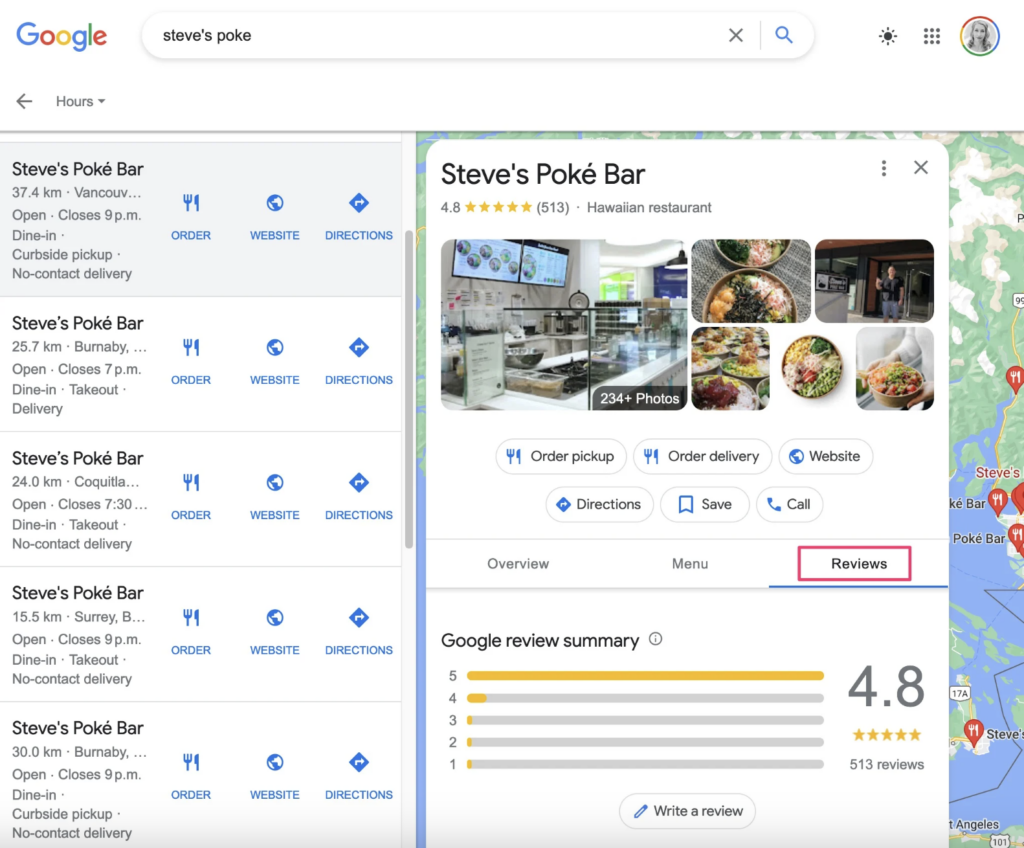
II. Ask For & Showcase Positive Reviews
Happy customers usually won’t leave a review unless you ask. Make it easy for them to send a quick link or follow up after a purchase. Once you have great reviews, work with marketing experts to feature them on your site, in marketing materials, and on social media to build credibility.
III. Address Negative Feedback Constructively
Negative reviews aren’t the end of the world, they’re a chance to show how you handle tough situations. Respond politely, take responsibility if needed, and offer to make things right. Your reply isn’t just for the reviewer, it’s for everyone else reading.
IV. Keep An Updated Blog Or Content Hub
Publishing fresh content signals that you are active, knowledgeable, and trustworthy. A blog, resource section, or content hub also gives you control over what ranks in search results. Share tips, answer FAQs, or highlight your values.
V. Share Customer Stories & Testimonials
Real experiences from real people are powerful. Share screenshots of reviews, create short video testimonials, or write up case studies. This kind of social proof builds trust faster than any sales pitch.
VI. Run Regular Reputation Audits
Don’t wait for a crisis to check in. Once a month or at least quarterly Google your business, read recent reviews, and scan social media mentions. Look for trends, outdated info, or anything that might need attention.
VII. Stay Transparent During Crises
If something goes wrong, be upfront. Acknowledge the issue, explain what you’re doing to fix it, and follow up publicly. People don’t expect perfection, they expect honesty. Being transparent builds more trust than silence ever will.
Conclusion
Reputation is built over time, but it only takes one misstep to damage it. Managing it well means being proactive, responsive, and real every step of the way.
If you re not sure where to start or you’re ready to take your brand’s online presence seriously, 99robots offers their expertise in managing your online presence.
Ready to take control of your reputation? Visit 99robots and get a customized plan that keeps your online presence working for you, not against you.







